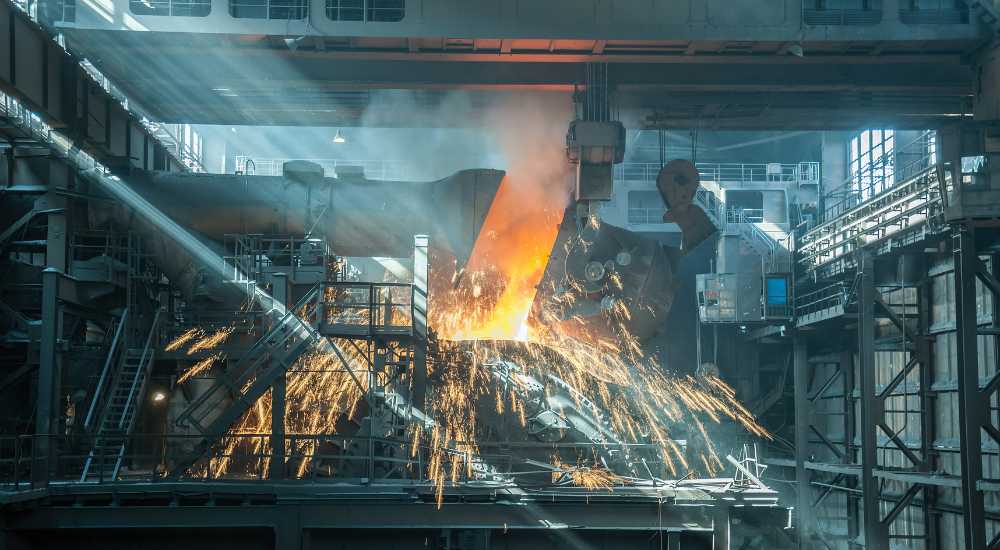Metallurgical engineers are essential professionals in metal extraction, refinement, and recycling. Applicants who have opted for metallurgical engineering study ores scientifically to predict metal recovery and develop extraction methods that really are effective. Also, they keep an eye on metal corrosion and fatigue and study ways to strengthen metals. Furthermore, they evaluate the metal to make sure it is of decent quality.
Additionally, they provide test reports and monitor how metals respond under stress. Metallurgical engineers design metal objects and supervise their forming operations, such as casting, in technological processes. They perform soldering and welding to join metal components as well. Metallurgists also investigate accidents brought on by metallurgical failures.
Metallurgy’s branch of engineering deals with the detailed study of various metals and how they are used in daily life. Careers in metallurgical engineering contribute to a diverse range of advancements in our civilization. Students who choose metallurgical engineering properly research the structure, bonding, and various environmental factors of metal.
What Do Metallurgical Engineers Do?
Metallurgical Engineer’s works involve improving production quality, cutting costs, and guaranteeing the environment is supported and FDA compliant by leading several autonomous, cross-functional projects.
They also Perform Programming, and touch-ups are part of the maintenance for CNC machines and robots. Raise awareness of and use of FCAW for structural and pipeline applications while reducing costs.
Metallurgical Engineers are in charge of Monitoring welding operations, visual weld inspections, coordinating vendor NDE services, and starting the necessary welding paperwork are all required. Review the requirements for the FAA 121 and FAA 145 certification processes and materials.
Eligibility Criteria (UG & PG) of Metallurgical Engineering
(I) Aspirants must complete their 10+2 with the required science subjects, PCB/PCM, in order to be admitted to the UG level or B.Tech in metallurgical engineering.
(II) In order to clear the qualifying examination, candidates must obtain an aggregate score of at least 55% in all of the aforementioned required subjects.
(III) Through lateral entry, individuals with any diploma in metallurgical engineering are also eligible to apply for this course.
Eligibility Criteria for M.Tech in Metallurgical Engineering
(I) Applicants must possess a BE or B. Tech degree to be eligible for admission to the PG level or the M.Tech course in metallurgical engineering.
(II) The qualifying exam’s minimum percentage needed is 50% overall or its equivalent CGPA, depending on the institute.
(III) Aspirants who are engaged in their final semester of BE are also eligible to apply.
Course Fees Metallurgical Engineering
How to Become a Metallurgical Engineer?
One of the primary things to be concerned about is how much schooling you require if you wish to work as a metallurgical engineer. According to the report, metallurgical engineers possess bachelor’s degrees in 75.6% of instances. In terms of higher education, master’s degrees are held by 16.9% of metallurgical engineers. Even though most metallurgical engineers have a college degree, it’s impossible to become one with only a high school degree or GED.
Before applying for a job, improving your metallurgical engineering skills would be a good idea. Join an internship and spend an average of 3-6 months. During this time, New metallurgical engineers gain the knowledge and abilities necessary for their specific job and employer.
After confirming your qualifications and grasp of the position’s duties, you may begin drafting your resume. Apply for jobs and start working as a Metallurgical Engineer. Here, we have outlined some of the top Recruiters of Metallurgical Engineers are:
ISRO
Larson’s Group
DRDO
The Metal Powder Company Ltd
Hindustan Aeronautics Ltd
NALCO
Cable Corporation of India Ltd.
Utkal Mineral
Required Skill for Metallurgical Engineering
Some crucial skills are required, including a solid background in math, physics, and chemistry, scientific aptitude, logical reasoning, perseverance, and strenuous effort. It’s also essential to be able to work well in teams, express oneself well using numbers and phrases, and solve issues.
In Addition, the ability to understand ideas more quickly, creativity, the ability to remain calm under pressure, proficiency in technical drawing, and computer abilities. One should be adaptable and flexible because they are expected to work on a variety of tasks at various workplaces.
Types of Job Roles Metallurgist
Metallurgist: A material scientist specializing in metals is called a “metallurgist.”
Welding Engineer: Welding engineers have the experience and knowledge to develop new methods, equipment, etc.
Manager: Managers are professionals who have to manage the production of metals in the metal industry.
Plant Equipment Engineer: Engineers are in charge of planning, designing, installing, and maintaining plant power systems.
Marketing executive: They carry out their marketing initiatives by communicating with the target audience.
Metallurgical lab technicians: They help metallurgical engineers with their daily lab tasks.
Quality Planning Engineer: They are responsible for planning to enhance the quality of any metallic item.
Researcher: Their tasks involve conducting more and more research to come up with new findings.
Senior Process Engineer: The procedure, effectiveness, efficiency, quality, and safety of the metallic goods all came under the engineer’s strict supervision.
Average Salary of Metallurgical Engineers
The salary which metallurgists receive varies according to the industry. Compared to other businesses, the aerospace industry pays metallurgists more. At the start of their careers, metallurgists can expect to make between Rs. 4,00,000 and Rs. 7,00,000. (per annum).
A candidate with appropriate professional experience can expect to earn between Rs. 7,00,000 and Rs. 10,00,000 yearly. Senior-level metallurgists who are well-established in their field and have achieved a high status can earn more than Rs. 15,00,000 annually.
Frequently Asked Questions on Metallurgical Engineers
Ans: Senior-level metallurgists who are well-established in their field and have achieved a high status can earn more than Rs. 15,00,000 annually.
Ans: Many students want to pursue a career in metallurgical engineering because it is fascinating, demanding, and rewarding industry.
Ans: Yes, there’s a growing demand for metallurgical engineers.
Ans: logical reasoning, perseverance, hard effort, etc., are some essential skills required by metallurgical engineers.
